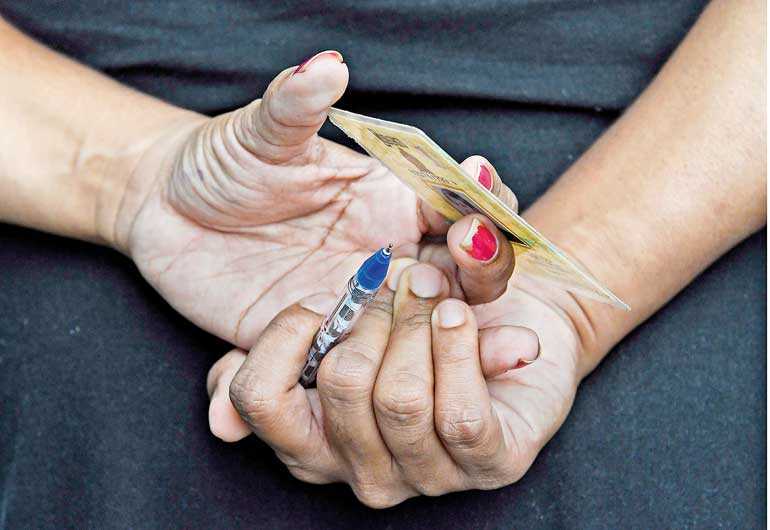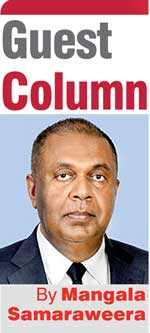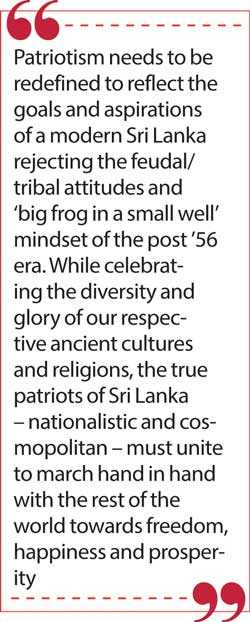Tuesday Feb 17, 2026
Tuesday Feb 17, 2026
Tuesday, 4 August 2020 00:26 - - {{hitsCtrl.values.hits}}

As Sri Lanka gazes into the abyss at the edge of the precipice, this truly is an existentialist moment for all Sri Lankans; each individual must make meaningful choices and the choice they make will define Sri Lanka’s future for generations to come – Pic by Shehan Gunasekara
It is a propitious moment to reflect on Sri Lanka’s democratic credentials and the future of democracy as we prepare for yet another General Election on 5 August – to select the 16th Parliament since 1947.
Since the introduction of the Executive Presidency and the Provincial Council system combined with the Parliamentary and Local Government Elections, hardly a year passes without a poll of one kind or another; if elections are the yardstick to measure a country’s democratic credentials, Sri Lanka will undoubtedly come on top as one of the most democratic countries in the world.
However in the 2019 Economist Intelligence Unit’s Democracy index, Sri Lanka is listed as ‘a flawed democracy’ at no. 69; with the rapid militarisation of the civilian administrative structures over the last several months since the 2019 Presidential Election, it should not surprise us if Sri Lanka is downgraded in 2020 to the ‘hybrid regime’ status and well on the way to the ‘authoritarian’ category.
Death of democracy
In the 20th century many democracies died as a result of coups d’état led by men with guns and tanks through military power and coercion. Democracies in Argentina, Chile, Pakistan, Thailand, Ghana died this way. Today democracies may die at the hands not of generals but of elected leaders, who subvert the very process that brought them to power. In fact many democracies erode slowly in barely visible steps and democratic backsliding begins at the ballot box. The paradox of the electoral route to authoritarianism is that democracy’s assassins use the very institutions of, democracy – gradually, subtly and even legally – to subvert and kill democracy.
The subversion and the slow strangulation of the democratic process and institutions in Sri Lanka has now been accelerated by President Gotabaya Rajapaksa and may have to be administered the final rites if he receives the two-thirds majority he is seeking but he is not the sole cause of it. Sri Lanka’s democratic institutions have been severely encroached by autocratic leaders since the 1970s and many of the checks and balances essential to a modern democracy have also been ruthlessly manipulated and undermined especially since the Executive Presidential system was introduced in 1978.
The Constitutional Council which was revived under the 19th Amendment is now in a near state of paralysis and the separation of powers between the Executive, the Legislature and the Judiciary is becoming increasingly blurred. The President has publicly declared that the independent commissions are a nuisance to his style of governance and seeks a mandate to roll back the 19th Amendment.
Racism, hate speech and ethnic and religious extremism allowed free reign with the law being applied selectively and to curtail freedom of speech and expression instead, has become the order of the day exerting further pressure on democracy in Sri Lanka which is essentially a multi ethnic, multi religious and multi lingual society. Sri Lanka’s inability as a nation to celebrate its diversity, upholding the rights of all its citizens is the single most important factor which has held back Sri Lanka’s sustainable progress and development. Today majoritarianism and chauvinism disguised as nationalism has become State policy.
Corruption, steadily rising since independence has now become a cancer eating into the very fabric of our society. Opening the economy in 1977 without the reforms and regulations and the level playing field essential for a dynamic market economy, has led to a corrosive form of crony capitalism. In short, corruption, recurring authoritarianism and resultant blows to civil, political and human rights have weakened Sri Lanka’s body politic and today the country is experiencing a menacing slide towards an autocratic state with a sinister convergence of the executive, the military and the clergy.
In fact, a new draft majoritarian ‘constitution’ for Sri Lanka prepared and spearheaded by some members of the Buddhist clergy and other Sinhala chauvinist groups has already been handed over to the President with much fanfare in the pro-Government media ‘to be approved outside Parliament’.
Without precedent, Gotabaya presidency, if given a strong mandate on 5 August, will drag the country into the abyss of prolonged militaristic authoritarianism disguised in pseudo-democratic icing. With an unprecedented economic crisis also in the offing and rising unemployment, repression and authoritarianism may well be the preferred option for the Rajapaksa mindset. This could prove catastrophic for a country often described as “Asia’s oldest democracy”.
An existentialist moment for all Sri Lankans
As Sri Lanka gazes into the abyss at the edge of the precipice, this truly is an existentialist moment for all Sri Lankans; each individual must make meaningful choices and the choice they make will define Sri Lanka’s future for generations to come.
Are we to define a new future for our country based on our fears and prejudices? Or are we to define our future based on our hopes and aspirations for a better Sri Lanka for all? Are we going to allow the handful of religious and racial megalomaniacs and other fundamentalist zealots who monopolise the sensationalist media to define our future while we silently wonder if moderation and tolerance are becoming bygone values of a distant and more civilised era?
The loud and violent sounds of extremism make better news than the democratic pronouncements of the silent majority. The silence of the majority in the face of extremism, intolerance, hatred and the pseudo patriotism of the vociferous few since independence has finally culminated in the massive crisis we face today as a nation.
The root causes of the crisis we are facing today are economic, religious or socio political in nature and an educational system which has totally failed to provide the knowledge and experiences and critical and analytical thinking as well as values needed to meet the challenges of a developing country like Sri Lanka.
As we slide towards open-ended polarisation and State-sponsored political anarchy, a vigorous reiteration of liberal values is the need of the hour; a Radical Centre. The centre should be home to a radical commitment to liberalism and centrist values. The need now is to create a new political culture based on reviving the value systems drawn from Lord Buddha’s middle path to Mahatma Gandhi’s path of non-violence, from Nehru to Martin Luther King, from Nelson Mandela to Barack Obama.
Achieving meaningful progress
Despite being one of the first countries to embrace the market economy in 1977, Sri Lanka still is, essentially a command economy bogged down by archaic legislation and a ‘socialist mindset’. The crony capitalist system practiced by this regime must be replaced by a caring and dynamic social market economy with the emphasis on an inclusive social safety net to protect the poor, the weak and the less fortunate.
An all-inclusive meritocracy is needed ensuring equality of opportunities for all and the culture of political patronage must come to an end. The rule of law is also an essential prerequisite for a civilised society where no one – king, priest or soldier – is above the law. This is essential for Sri Lanka to achieve meaningful progress including winning investor confidence as well as the confidence and trust of our own citizens to participate meaningfully in the development of our nation.
As Sri Lanka hurls towards an unprecedented political and economic crisis, a renewal of the consensual democracy that looks beyond the adversarial politics of the left and the right is an urgent necessity. Aristotle in his treatise ‘Politics’ of 350B.C. writes about the ‘middling element’ as the substance that bridged the chasm between the rich and the poor echoing Siddhartha Gautama from a century before. Today, as Sri Lanka stumbles from one crisis to the other the middling element may prove to be our only alternative.
There are those who may think that the ‘middle path’ is a philosophy of weakness and impotence where ‘bleeding heart liberals’ will try to find excuses and justifications for any situation with an ‘anything goes’ attitude, where the rule of law is irrelevant. In fact many people confuse liberalism with the laissez faire attitude of libertarianism.
The middle path or ‘Radical Centre’
The middle path or ‘Radical Centre’ is based on the principles of democracy, freedom, equality and justice as the four pillared foundation for a just, caring and prosperous society. Although many may say that a Radical Centre is a contradiction in terms, a radical recommitment to liberal democratic principles is an urgent necessity along with the courage of ones convictions even to wage a non-violent struggle if and when necessary to protect and achieve these values. The Radical Centre is a platform of moderation providing the silent majority to oppose and fight authoritarianism, racism and all other forms of extremism actively and vigorously.
The ‘Radical Centre’ entails the creation of a centrist middle way where dissenting voices and opinions from every part of the political spectrum would have a place within a democratic framework of decentralised governance. It is a system where diversity in all its manifestations is celebrated; the years of deep mistrust between the different communities must lose its sting within a non-violent, democratic framework where pluralism and secularism flourish.
The Radical Centre should show the intolerant that those they hate are in fact, quite similar to themselves and have the same dreams and aspirations as well as the same fears and concerns as human beings. The Radical Centre should be the point where all Sri Lankans can discover their common humanity going beyond the boundaries of race, creed and caste.
The outcome of the election on 5 August is irrelevant as neither Gotabaya Rajapaksa and the SLPP nor the divided Opposition have a vision to solve this crisis of democracy and governance – culmination of several decades of bad governance and mismanagement. The return to centrist values is the only possible path to ensure the survival of democracy whose credentials are being pushed to the limits by the forces of political opportunism and extremism.
The alternative is not an autocracy based on the convergence of the executive, military and the clergy as hinted by the President nor is it a ‘strong’ government with a two-thirds majority as pursued by the Prime Minister. All governments which obtained two-thirds majority – in 1970, 1977 and the bribe induced two-thirds majority of 2010 – contributed to the rot and decay in governance we witness today.
Urgent recommitment to democracy needed
An urgent recommitment to democracy is the need of the hour. Democracy, despite all its flaws and shortcomings, remains the best system of governance as we move towards the second quarter of the 21st century. We have been paying lip service to democracy by having regular elections but almost all our democratic institutions along with the necessary checks and balances have been severely undermined over the years. Even the few steps taken in 2015 to strengthen such institutions are planned to be rolled back after the elections if the SLPP obtains a large majority.
All right-thinking people across Sri Lanka must break their silence and unite to protect democracy. The tyranny of the few can only be defeated if the silent majority – the true patriots – wakes up from their somnambulist stupor to say ‘enough is enough’.
True to the saying by Samuel Johnson, patriotism in Sri Lanka has now become the ‘last refuge of the scoundrel’; patriotism as encouraged today is thinly-veiled racism and overzealous chauvinism which has been the main cause of our downhill journey since independence.
Patriotism needs to be redefined to reflect the goals and aspirations of a modern Sri Lanka rejecting the feudal/tribal attitudes and ‘big frog in a small well’ mindset of the post ’56 era. While celebrating the diversity and glory of our respective ancient cultures and religions, the true patriots of Sri Lanka – nationalistic and cosmopolitan – must unite to march hand in hand with the rest of the world towards freedom, happiness and prosperity.